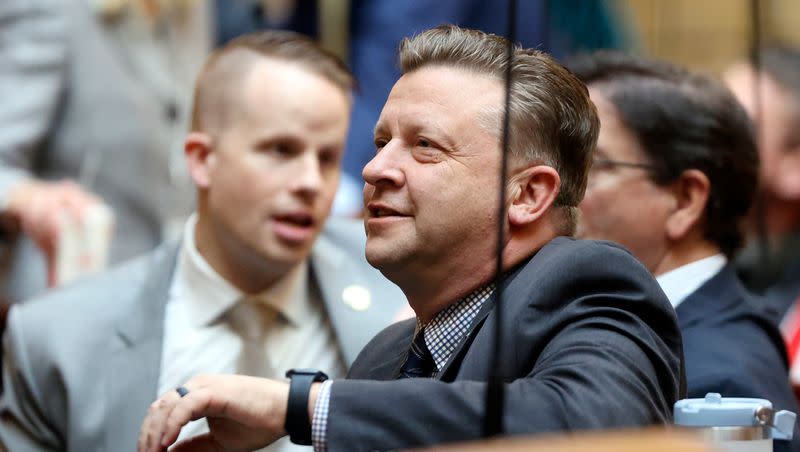Utah’s version of the Religious Freedom Restoration Act passes the Senate

- Oops!Something went wrong.Please try again later.
- Oops!Something went wrong.Please try again later.
Utah’s version of the Religious Freedom Restoration Act passed the Senate and is awaiting a House floor vote.
Shepherded by Sen. Todd Weiler, R-Woods Cross, and Rep. Jordan Teuscher, R-South Jordan, SB150 prohibits any government entity from substantially burdening a person’s right to exercise religious freedom “unless the burden is essential to furthering a compelling governmental interest and is the least restrictive means of furthering that interest.”
When Weiler introduced the bill in committee, he said it was intended as a “backstop” in case the federal Congress repealed the Religious Freedom Restoration Act.
The Religious Freedom Restoration Act was signed into law by former President Bill Clinton in 1993. It was the result of a bipartisan collaboration that involved Muslims, evangelicals, The Church of Jesus Christ of Latter-day Saints and the ACLU among other groups. It was aimed at allowing people of faith to challenge policies that they say interfere with their religious freedom.
Related
Other states, including Arizona and West Virginia, have passed versions of this bill. “We’re not trying to reinvent the wheel,” Weiler said. He later explained he modeled the bill after Arizona’s legislation because it had the same objectives he wanted to accomplish.
Throughout the legislative process, language was changed from the original bill. While SB150 originally had a provision prohibiting the bill from being used as a way “to justify ending the life of an individual, including ending the life of an unborn child,” that language was removed from the bill that passed through the Senate.
“I’m not trying to wade into the abortion debate with this,” Weiler said. Originally, Weiler had modeled the legislation after West Virginia’s bill which does include a provision related to abortion, but he took it out, saying he did not want to “pick at scabs” on this issue. Sen. Karen Kwan, D-West Valley City, had raised the concern over this provision.
At the bill’s committee hearing, Stan Rasmussen, vice president of government affairs at the Sutherland Institute, read a statement from William C. Duncan, the institution’s constitutional law and religious freedom fellow at the institute. “Such legislation protects people of faith and others without requiring litigation over every potential dispute caused by governmental policy that may impact religious exercise.”
Reading from Duncan’s statement, Rasmussen said the bill creates a framework for addressing unforeseen conflicts. “It gives clear directions to government entities so that many potential conflicts can be avoided, and to state courts about how to resolve the conflicts if they arise.”
Ellie Menlove, legislative and policy counsel for ACLU Utah, read the organization’s statement in opposition to the bill, noting the organization supports efforts to protect religious freedom rights. “The bill is bound to lead to costly religious exemption lawsuits whether meritless or not.” Menlove said the group was concerned the bill “could also permit individuals to argue that their religious beliefs don’t align with laws that prohibit discrimination.”
As an example, Menlove said the bill could lead to a police officer using religious beliefs to refuse defending a synagogue or mosque.
In response to ACLU Utah’s concerns, Weiler said he respected and understood the concerns, but he said, “I just don’t think that by us emulating federal law, we’re going to create a problem that isn’t already there.”
While LGBTQ+ advocacy group Equality Utah originally had concerns the bill would override existing protections in code that prohibit discrimination against LGBTQ+ Utahns in housing and employment as well as the existing ban on conversion therapy, the group issued a statement after working with Weiler to make changes.
“We are grateful the sponsor, Sen. Weiler, heard our concerns and incorporated language in the bill to make clear that the rights conferred in these previously enacted bills are preserved and protected,” the group’s statement said. “With the inclusion of this new language, the bill passed out of the Senate unanimously.”
Related
What is the Religious Freedom Restoration Act?
The Religious Freedom Restoration Act is a federal law that strengthened legal protections for people exercising their faith. Sen. Ted Kennedy, D-Mass., and Sen. Orrin Hatch, R-Utah, shepherded it through the Senate. The lead House sponsor on the bill was now-Senate Majority Leader Chuck Schumer, D-N.Y.
The law came about after the Supreme Court case Employment Division v. Smith. The case was about whether or not employment laws around illegal drugs should make an exemption for Native Americans who use peyote during religious ceremonies. The majority opinion written by Justice Antonin Scalia set the precedent that laws that may impact religious practices do not violate a person’s right to exercise their religion as long as the laws are enforced with neutrality and were not crafted with an intention to harm a particular religion.
After this decision was handed down, Congress passed the Religious Freedom Restoration Act.

